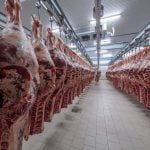The province’s agriculture and agri-food sector is feeling the crunch as more and more workers call out sick with COVID-19.
The fourth wave of the pandemic, and the highly transmissible Omicron variant, continue to roll over Manitoba, with public health officials now suggesting that most Manitobans will likely be exposed to the virus in the next weeks.
Official counts as of Jan. 13 had over 36,000 active cases in the province — numbers that health officials have warned are significantly low, since only positive PCR results, not results from home-use rapid antigen tests, are being tracked.
Why it matters: As COVID-19 cases rise, the increase of barn workers, truckers and processing staff falling ill is leaving labour gaps.
The labour impact is clearly evident in the pork sector.
Manitoba Pork Council general manager Cam Dahl said the stress is being felt at all levels of the supply chain.
“It’s not at a point where I’m seeing bottlenecks in the supply chain,” he said. “but things are really tight and yes, labour shortages are very real and they’re having an impact.”
The sector was already feeling the pressure going into the pandemic, while current circumstances have worsened the trend, Dahl said.
Labour shortages were already an issue, while the pandemic also created barriers to accessing employees from outside Canada. There were problems both bringing in temporary foreign workers as well as drawing employees through permanent residency streams, he said.
“So we already have a system that’s significantly under strain, when people start to need to spend time away from work because they have COVID,” he said.
As well as concerns at the processing level, the pork council has noted barn staff falling ill. The situation is complicated by an ongoing outbreak of porcine epidemic diarrhea in dozens of hog barns across Manitoba (see story on page 15).
“This is a concern on farm, to ensure that we have enough staff to take care of our animals, so we have enough staff to enforce the rigid biosecurity protocols that we need to enforce,” Dahl said.
Strain on transportation has added another layer of concern. Trucking, like other industries, has also seen staff out sick, while the highly integrated pork sector is highly reliant on trucks being on the road.
In an email to the Co-operator, a representative from Maple Leaf Foods confirmed the company has seen a rise in absenteeism in its sites and plants as nationwide COVID-19 cases have spiked. Some of that is due to illness, they said, while precautionary isolations have also chipped away at staffing numbers.
“All of our plants continue to operate,” the company said. “We have been making adjustments to production as necessary and reducing any non-essential activities to ensure we can continue to safely operate and deliver the nutritious food people need.
“We will maintain our vigilant safety efforts to protect our team members and the local community and we encourage every team member and every Canadian to get booster shots as soon as possible because full vaccination is the best tool we have to bring an end to this pandemic.”
The company did not share how many employees were out sick or isolating, specific to its Brandon pork plant.
A representative from HyLife Foods likewise said that, “like all companies, navigating employee absences during this pandemic has become a reality.”
“We have been extremely proactive and prioritized investing in additional measures including a medical team,” they said.
Potatoes
Keystone Potato Producers Association manager Dan Sawatzky also said that he had heard from J.R. Simplot and McCain Foods — Manitoba’s two major potato-processing companies, both based in Portage la Prairie — and that both were also dealing with the issue.
“There are certainly cases among the employees at the processing plants, just like there would be in the general public,” he said.
There had been talk that at least one shift might be impacted, he said.
The sector had previously seen some issues with availability of grading staff, he added.
“There is certainly strain on the system when those kinds of things happen,” he said. “It backs up potatoes in growers’ sheds.”
Demand for potatoes, however, has been high.
While short yields are never a good news story, Sawatzky noted that Manitoba’s short potato crop this year means that “there would have to be quite a disruption” to impact the local crop.
Potatoes were among the many crops to take a yield hit from drought conditions this year.
In fall 2021, the Keystone Potato Producers Association reported yields between two-thirds to three-quarters of normal in areas like Carman and Winkler, while other areas of central Manitoba saw yield drops of 15 to 20 per cent. Some producers were able to meet their contract volumes, Sawatzky said at the time, but many others expected to fall below contracted volumes.
Charlie Angelakos, vice-president of global external affairs and sustainability with McCain Foods, said they are concerned by the spread of COVID-19 in Portage la Prairie and are monitoring the situation closely.
“We have been in close contact with public health officials and continue to follow their guidance,” Angelakos said. “As part of our COVID-19 protocols we have run vaccination campaigns and encouraged all our employees to be vaccinated. We’re proud of the dedication of our employees and have done everything in our power to keep them healthy and safe during these difficult times.”
Official provincial numbers as of Jan. 13 counted 340 active cases in the city of Portage la Prairie.
Angelakos did not confirm whether processing volumes had been impacted by staffing gaps, but said the company “constantly monitor(s) and adjust(s) production lines according to labour availability and product demand in the market.”
J.R. Simplot did not respond to requests for comment as of press time, although Sawatzky noted that recently expanded sections of the plant were more automated and thus less affected.
Sawatzky says he is not significantly concerned that the situation might stretch long enough for more serious supply chain issues.
“We’re into this a little ways already and (the processors) have been able to keep going,” he said. “They’ll make adjustments and changes along the way.”















